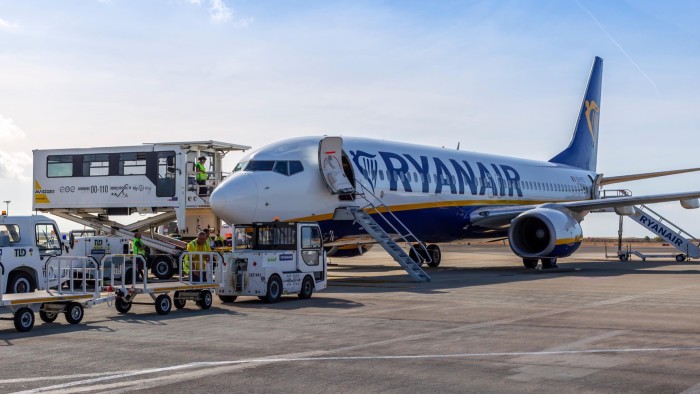Unlock the Editor’s Digest for free
Roula Khalaf, Editor of the FT, selects her favourite stories in this weekly newsletter.
Ryanair has taken advantage of the fall in oil prices to hedge a “significant” amount of its future fuel requirements, and is yet to see any impact on bookings from US tariff turmoil, chief executive Michael O’Leary has said.
O’Leary said the low-cost airline had this month “very significantly extended” its fuel hedges for its next two financial years at “dramatically lower oil prices”.
He added that the airline had not seen a change to booking patterns, even as the spectre of tariffs sparked fears of a global economic slowdown. “We don’t see anything this summer in Europe,” he said in an interview.
The price of jet fuel has fallen more than 10 per cent so far in April, following crude oil lower as US President Donald Trump’s tariffs sparked concerns over the health of the global economy, according to data from S&P Global Commodity Insights.
European airlines typically hedge a significant proportion of their expected requirements for jet fuel in advance, entering financial contracts which work as an insurance policy to protect against sudden swings in oil prices.

Fuel can make up as much as a third of an airline’s overall operating costs, and the fall in prices offers some relief for an industry facing questions over future demand for flying, which is typically closely correlated to the health of the economy.
Low-cost airlines stand to benefit in particular, because fuel accounts for a greater proportion of their overall costs than long-haul carriers such as British Airways owner International Airlines Group, said analysts at Bernstein.
“We and our passengers are going to be a very significant net beneficiaries from the dramatic decline in oil prices,” O’Leary said.

Ryanair had previously hedged about 70 per cent of its fuel needs for its 2026 financial year, which runs until next March, and 15 per cent of the following year, but increased its hedges this month, O’Leary said.
He declined to give further details, citing the company’s “closed period” before its next financial results. In Ryanair’s third-quarter results, the airline said it had hedged fuel costs at $77 a barrel for its 2026 financial year. Jet fuel was trading this week at about $66 per barrel.
Still, fuel hedges do not always work out. Ryanair took a €300mn hit in 2020 because of a wrong way bet on fuel prices just before the pandemic struck in 2020.
Rival Wizz Air was also caught out after it stopped hedging before Russia’s full-scale invasion of Ukraine in 2022 sent oil prices soaring. The airline has since restarted hedging.
London-listed easyJet, Wizz Air and IAG all declined to comment on whether they had also taken advantage of the lower oil prices.

Neil Glynn, a managing director at Alvarez & Marsal, said airlines faced difficult choices when deciding whether to purchase fuel hedges in the current environment.
“It is early for capacity decisions on winter 2025/2026 and beyond, but hedging activity also needs to be considered alongside potentially fluid capacity and fuel consumption plans should demand weaken over the coming weeks and months,” he said.
Most major US carriers do not hedge their fuel requirements. One of the last holdouts, Southwest Airlines, in March said it would stop hedging, in part to save money on premium payments to banks. American, United and Delta stopped doing so in 2014, 2015 and 2017, respectively.
United Airlines chief financial officer Mike Leskinen told investors last week that lower fuel costs meant the airline might still meet the financial guidance it laid out in January. “Fuel hedging doesn’t make sense in this industry,” he said.
https://www.ft.com/content/0c2f7f8e-3cd5-4ada-a3be-c01b69a181f3


